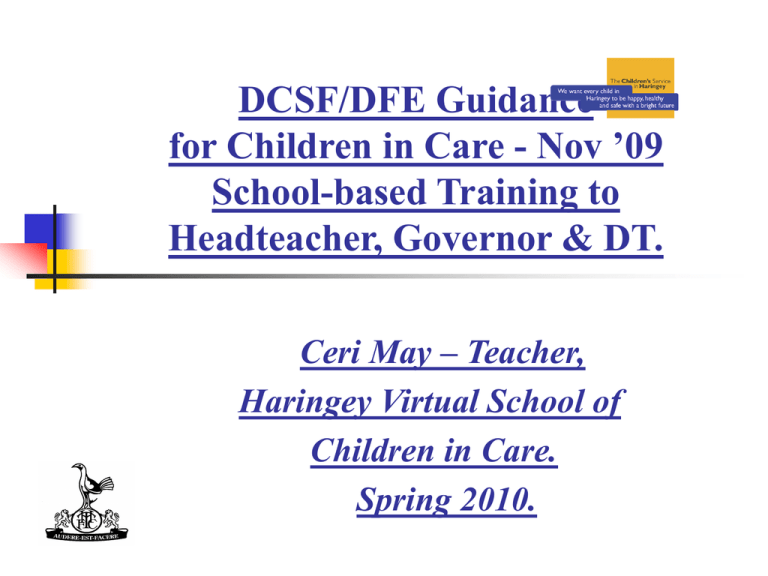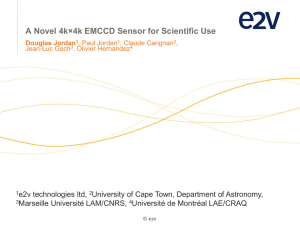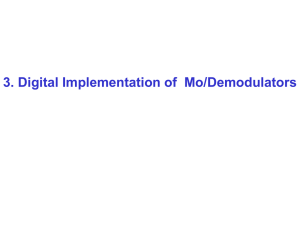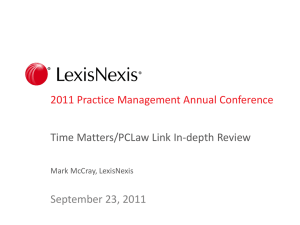Training: Guidance for Governors, Heads
advertisement

DCSF/DFE Guidance for Children in Care - Nov ’09 School-based Training to Headteacher, Governor & DT. Ceri May – Teacher, Haringey Virtual School of Children in Care. Spring 2010. Key Message to Governing Bodies of Maintained Schools: Statutory Framework The Governing Body is required to appoint a designated teacher (DT) to promote the educational achievement of Children in Care (CiC). Required under the Children & Young Person’s Act ’08. Regulation came into force on 1.9.09. Key Message to Governing Bodies of Maintained Schools The DT must be one of the following: A qualified teacher who has successfully completed an induction period and is working as a teacher at the school. The Head Teacher, or Acting Head Teacher. A teacher with appropriate seniority, professional experience and status to provide leadership, training, information and advice about the specific needs of CiC. A person who has carried out the role of DT for at least 6 months prior to the regulations coming into force, is planning to train to become a teacher, and is likely to be qualified by 1.9.12. Where the DT is not a member of the senior leadership team, a member of the team should be designated as a champion of CiC issues and work closely with the DT. Key Message to Governing Bodies of Maintained Schools The Role of the Governing Body: The governing Body, in partnership with the Head Teacher, is responsible for monitoring how well the DT role is working (not performance management). Ensure, in partnership with the Head, that the DT undertakes appropriate training. (Section 20(2) – 2008 Act). Key Message to Governing Bodies of Maintained Schools As a minimum, governors should consider an annual report from the DT and act on any issues it raises to Support the DT Maximise the impact of the role It is important that the report does not refer to children by individual name; confidentiality. In addition to considering and acting on the report, the governing body should make sure that arrangements are in place to keep themselves informed about provision for, and attainment of the CiC on the school roll on a more regular basis. Key Message to Governing Bodies of Maintained Schools Ensure that the DT is receiving appropriate levels of support to fulfil the role. Ensure, with the school leadership team, that the DT role contributes to school staff in terms of developing a deeper understanding of the needs of CiC. Ensure, with the school leadership team, that all staff maintain high levels of expectation for CiC. Indicators which demonstrate that the DT role is being implemented efficiently: The school has a clear overview of the educational needs and progress of CiC on their roll. School policies are effective in reflecting the educational needs of CiC. Resources are allocated to support the DT to carry out the role effectively. The Annual DT Report should enable the Governing Body to make judgements about the effectiveness of the DT Role in the context of wider school planning in relation to: Workload issues; dependant on number of CiC on roll. Levels of progress made by CiC, compared to all children. Patterns of attendance and exclusions; different for CiC compared to all children? Any process or planning issues arising from Personal Education Plans (PEPs). Any CiC identified as Gifted and Talented? How are those needs being met? Any CiC with SEN; Statement, School Action or School Action +? The Annual DT Report should enable the Governing Body to make judgements about the effectiveness of the DT Role in the context of wider school planning in relation to: How the teaching and learning needs of CiC are reflected in school development plans. Training to DT to enable them to impart knowledge to colleagues about the education and well-being of CiC. Work with Virtual Schools or CiC Teams in Local Authorities. The impact of school policies on CiC – eg. charging for educational visits and extended school activities; permission for school trips and allocation of places. Using information gained from the DTs Annual Report: The Governing Body and School Leadership Team should consider: Whether the DT has sufficient time and resources to carry out their role effectively. Training, support and development needs required to ensure the role is carried out effectively. The extent to which school policies take account of the particular needs of CiC. Whether the school is making the fullest use of resources; prioritising CiC for school-based interventions, including one-to-one tuition. The Role of the DT: The DT should: Agree a high quality Personal Education Plan with the Social worker and key partners, and review within timescales. Provide a central point of contact at the school for all agencies working with CiC. Be responsible for coordinating strategies to raise the attainment of CiC. Create opportunities for CiC to access additional resources for learning; particularly one-to-one tuition. The Role of the DT: Be responsible for understanding the wider needs of CiC. Offer training and information to colleagues on the specific needs of CiC. Champion high expectation within the school for CiC. Inform whole-school policy writing to ensure CiC are not disadvantaged. Promote home-school links and raise awareness with school staff of the particular needs of carers. Why is the Government Targeting this Group? Poor Outcomes for CiC Nationally: Even when achieving average or above at the end of KS2, they often drop off academically and/or socially in KS3 & 4. Vulnerable girls / high rates of early pregnancy. High risk of becoming NEET. High risk of offending. In and out of care; still part of the vulnerable group. ‘They are 5 times less likely to achieve 5 good GCSEs and 8 times more likely to be excluded from school. They are less likely to go to university and more likely to end up in prison.’ (Ed Balls). The Value of the Head – Governor – DT Triangle As a group you can fulfil a vital role for CiC: Operating at a strategic level. You can help safeguard against the risk factors outlined in previous slide. You can offer support in terms of de-personalising events for adults, and help them reflect on the known difficulties of working with children who may carry strong emotions. By developing a common understanding of the impact of exclusion on this group in particular, you could help in the planning and thinking around this issue. Key Messages from Government: PEPs are more important than ever. Every CiC on roll must have a PEP. The DT is responsible for ensuring a current and working PEP is available at the school. PEPs should set high expectations of rapid progress. Additional support should be put in place so that the CiC succeeds. A CiC should access additional support even if they do not meet the criteria. New Ofsted Criteria have limiting judgements on CiC. High Ofsted focus on Vulnerable Groups.











